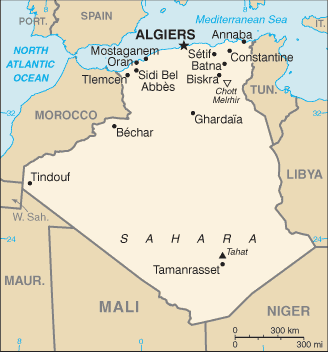

Primary Source Collections:
Individual Primary Source Documents:
Secondary Sources:
From The Atlantic Magazine. Basic facts in chronological order.
"The Algerian War: Cause Célèbre of Anticolonialism" from JSTOR Daily, presented as bullet points:
Algeria's Independence: On July 5, 1962, Algeria declared independence after 132 years of French occupation, marking the end of a seven-and-a-half-year war.Wikipedia+5JSTOR Daily+5JSTOR Daily+5
Global Awareness: The Algerian struggle was internationally recognized, highlighted by films like Gillo Pontecorvo’s The Battle of Algiers and figures such as Djamila Bouhired and Frantz Fanon.
FLN's Strategy: The National Liberation Front (FLN) aimed to internationalize the conflict, aligning it with Cold War dynamics to gain Eastern Bloc support and bring attention to the United Nations.JSTOR
Evian Agreements: Signed on March 18, 1962, these agreements initiated a ceasefire and a transitional period leading to a self-determination referendum on July 1, 1962.JSTOR Daily+3Wikipedia+3Wikipedia+3
Symbolic Independence Date: July 5 was chosen for the official celebration of independence, symbolically reversing the French capture of Algiers on the same date in 1830.Wikipedia+1JSTOR Daily+1
Ahmed Ben Bella's Statement: Algeria's first president referred to colonization as "an accident in history," suggesting that independence restored the nation's historical trajectory.
Celebrations: Despite attempts to delay festivities until July 5, widespread celebrations occurred, with reports of extended festivities and nationwide revelry.
Socialist Experiments: Post-independence, Algeria pursued socialist policies, including agrarian reform and self-management, influenced by FLN's 1962 platform adopted in Tripoli.JSTOR Daily
International Solidarity: Algeria became a hub for global revolutionaries, offering training and support to figures like Nelson Mandela and receiving aid from countries like Cuba.JSTOR Daily
Algiers as a Revolutionary Center: The capital became known as the "Mecca of revolutionaries" in the 1960s and 1970s, attracting activists worldwide to contribute to Algeria's post-colonial development.JSTOR Daily
Portal to multimedia collections about Africa. Created by MATRIX in partnership with Michigan State University and African universities and cultural heritage organizations.
FBIS was an intelligence component of the CIA's Directorate of Science and Technology that provided translations of radio broadcasts in selected foreign countries from 1974 to 1996. Search these daily reports by location, publication type, or keyword.
A multidisciplinary streaming video collection containing documentaries, films, interviews, music, news programs, and performances.
Covers public affairs, public and social policies, and international relations, and includes journal articles, books, government documents, reports, and more.
Indexes the most popular general-interest periodicals published in the United States from 1890-1982.
Online Access - 2 simultaneous users
Indexes a wide range of important journals in the humanities and social sciences from 1907 to 1984.
Contemporary and historical images from the Associated Press. Includes photographs, audio sound bites, graphics and text
Full-text of several U. S. newspapers. Good for a U. S. perspective on world events. You can select newspapers to search by clicking on the boxes next to the newspaper titles in the second part of the screen. Click continue at the bottom of the screen after you have made your selection.
The Times (London) is considered the "world's newspaper of record." Full-text to over 200 years of the publication.
HathiTrust is a partnership of academic & research institutions, offering a collection of millions of titles digitized from libraries around the world. To login, click on the bright yellowish/orange LOG IN button. Select University of Tennessee, Knoxville from the drop-down list and log in with your NetID/password.
Article in History Today by Martin Evans.
Images from the journal Business Insider.
This collection from Michigan State University preserves and makes available online the records of activism in the United States to support the struggles of African peoples against colonialism, apartheid, and social injustice from the 1950s through the 1990s.
Full and partial images of thousands of books and periodicals digitized by Google. To limit results to full-text, use the advanced book search and click on "full-view only." Particularly good resource for finding the complete text of older books and periodicals.
Documentary history of the revolution created as part of a Marxist site. There will a "Marxist" bent to all content on this site.
On 1 November 1954, hostilities broke out between the Christian colonists of French descent and Algerian Muslim nationalists who were organized into the Front de Libération Nationale (FLN) under Ben Bella. Despite its initial inferiority, the brutality of the well-armed French and colonists' troops soon brought the FLN agrarian mass support. The FLN continued to rely on guerrilla attacks, which spread to Algiers in late 1956. . . Read more

French Foreign Legion in Algeria, 1960

Front de Libération Nationale (FLN) revolt,
November 1, 1954